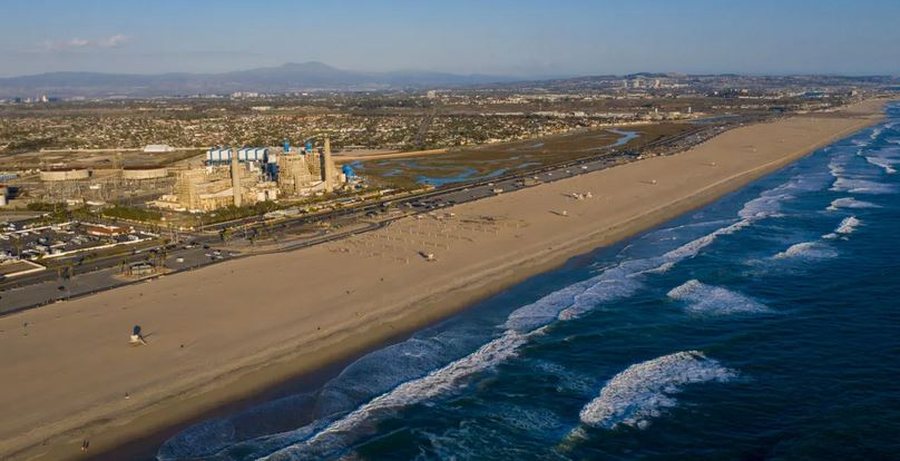Oqeanet, ekonomia e 5-të më e madhe në botë - “Superfuqia” oqeanike ka dyfishuar vlerën në 25 vjet

Nëse oqeanet do të ishin një shtet, ato do të ishin ekonomia e pestë më e madhe në botë. Nga viti 1995 deri në vitin 2020, oqeanet përbënin 3% deri në 4% të vlerës së shtuar bruto globale të planetit dhe deri në 133 milionë vende pune me kohë të plotë.
Këto llogaritje u bënë nga Organizata për Bashkëpunim dhe Zhvillim Ekonomik në raportin e fundit mbi Ekonominë Globale të Oqeaneve deri në vitin 2050. Raporti gjithashtu specifikon se oqeanet mbulojnë 71% të sipërfaqes së Tokës dhe përbëjnë 90% të biosferës. Ato ofrojnë siguri ushqimore për mbi 3 miliardë njerëz, lejojnë transportin për mbi 80% të mallrave të botës, si dhe strehojnë kabllo nëndetëse që mbajnë 98% të trafikut ndërkombëtar të internetit.
Këto janë arsyet kryesore pse nëse oqeanet do të ishin një vend, ato do të ishin ekonomia e pestë më e madhe në botë bazuar në të dhënat e vitit 2019. Sot, vendet më të mëdha sipas PBB-së janë Shtetet e Bashkuara me 27.72 trilionë dollarë, Kina me 17.8 trilionë dollarë, Gjermania me 4.52 trilionë dollarë, Japonia me 4.2 trilionë dollarë dhe India me 3.56 trilionë dollarë në vendin e pestë. Dhjetë vendet e para plotësohen nga Britania me 3.38 trilionë dollarë, Franca me 3 trilionë dollarë, Italia me 2.3 trilionë dollarë, Brazili me 2.17 trilionë dollarë dhe Kanadaja me 2.14 trilionë dollarë.
Ekonomia globale oqeanike është dyfishuar në terma realë në 25 vjet, nga 1.3 trilionë dollarë amerikanë në vitin 1995, në 2.6 trilionë dollarë në vitin 2020, duke regjistruar një normë mesatare vjetore rritjeje prej 2.8% gjatë kësaj periudhe.
Siç thekson Organizata, nëse këto trende historike vazhdojnë, ekonomia globale oqeanike mund të katërfishohet deri në vitin 2050, krahasuar me nivelet e 1995-s.
Turizmi, nxjerrja e naftës dhe gazit në det të hapur gjeneruan rreth dy të tretat e vlerës totale bruto të shtuar nga oqeanet. Megjithatë, shpërndarja e fuqisë punëtore pati variacione të mëdha. Turizmi detar dhe bregdetar ishte punëdhënësi më i madh në ekonominë oqeanike, ndërsa nxjerrja e naftës dhe gazit në det të hapur gjeneroi prodhim të lartë ekonomik, por punësim relativisht të ulët. Prodhimi ekonomik nga ndërtimi i anijeve dhe energjia e erës në det të hapur gjithashtu u zgjeruan me shpejtësi.
Në veçanti, turizmi bregdetar detar me një vlerë prej 789 miliardë dollarësh, dhe nxjerrja e naftës dhe gazit në det të hapur me 988 miliardë dollarë, përbënin pjesën më të madhe të vlerës totale bruto, sipas Organizatës.
Energjia e erës në det të hapur dhe energjia e rinovueshme detare kanë përjetuar një normë mesatare vjetore rritjeje prej 31%, me vlerën e shtuar bruto globale, që është rritur nga 38 milionë dollarë në vitin 2000 në 4.6 miliardë dollarë në vitin 2020.
Nivelet e punësimit në ekonominë oqeanike kanë mbetur relativisht të qëndrueshme, duke arritur kulmin në 151 milionë ekuivalentë me kohë të plotë në vitin 2006. Më pas, ato ranë në 101 milionë në vitin 2020 për shkak të pandemisë COVID-19 dhe që atëherë janë duke u rikuperuar.
Republika Popullore e Kinës, Shtetet e Bashkuara, Japonia, Norvegjia dhe Mbretëria e Bashkuar kishin ekonomitë më të mëdha oqeanike në terma absolutë gjatë kësaj periudhe. Megjithatë, vende si Norvegjia varen më shumë nga oqeani për ekonominë e tyre, vëren raporti.

Projekt për rigjallërimin e Ish-Uzinës së Autotraktorëve - Rama: Fokusi në prodhimin ushtarak dhe krijimin e vendeve të punës
Kryeministri Edi Rama prezantoi projektin e rigjallërimit të Ish-Uzinës së Autotraktorëve që do të jetë në funksion të industrisë ushtarake, për prodhimin e......

“Ndikimi i tarifave, më i lartë se rimëkëmbja gjermane” - FMN ul parashikimet për eurozonën për shkak të pasigurive tregtare
Shpenzimet më të larta gjermane për infrastrukturën do të nxisin rritjen ekonomike të Evropës në vitet e ardhshme, por jo aq sa të tejkalojnë ndikimin e......

Adoleshentet kodojnë 4 herë më shumë se meshkujt/ Eurostat: Femrat shqiptare renditen të parat në rajon
Eurostat ka publikuar së fundmi një raport mbi përdorimin e pajisjeve dhe aftësive të ndryshme digjitale nga adoleshentët e grupmoshës 16-19 vjeç. Sipas......

Burokracia, “plagë” e ekonomisë gjermane - U kushton bizneseve të vogla e të mesme mbi 61 miliardë euro në vit
Ndërmarrjet e vogla dhe të mesme në Gjermani shpenzojnë 61 miliardë euro në vit vetëm për shkak të burokracisë, sipas bankës gjermane të zhvillimit KfW. Në......

“Ekonomia shqiptare do të rritet 3.2% këtë vit” - BB: Nuk “preket” nga pasiguria e politikave tregtare globale
Ekonomia e Shqipërisë parashikohet të rritet me 3,2% në vitin 2025 dhe 3,1% në 2026, pavarësisht pasigurisë së politikave tregtare globale dhe ndryshimeve që......

Kapaciteti global i erës, rekord në vitin 2024 - Kina dominon sektorin, me pothuajse gjysmën e totalit botëror
Raporti i Këshillit Global të Energjisë së Erës tregoi se kapaciteti i ri arriti një rekord në vitin 2024 për herë të dytë radhazi, pas dy vitesh rënieje.......

Udhëtimi me tren, kompensime për pasagjerët - Kostot për Shqipërinë, Komuniteti i Transportit: Duhen ligje e organe të posaçme
Teksa Shqipëria po zhvillon disa projekte hekurudhore, Komuniteti i Transporit kërkon transpozimin e legjislacionit evropian dhe ngritjen e strukturave......

Policia e Shtetit, me mjete të reja - Hapet tenderi 450 milionë lekë për flotën e re
Operatori i Blerjeve të Përqendruara ka shpallur hapjen e tenderit me objekt marrje mjetesh rrugore me qira për Policinë e Shtetit, ndarë në dy lote: marrje......

















